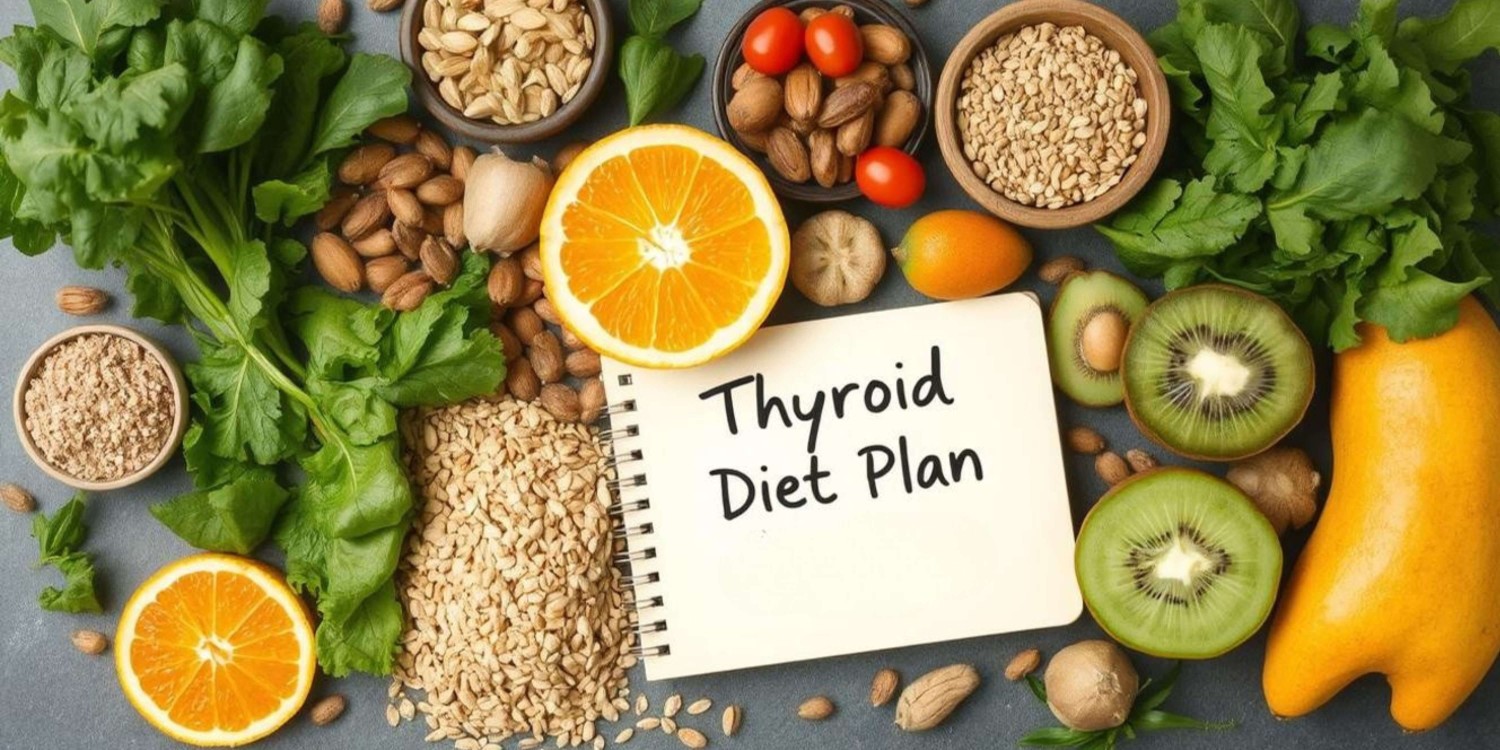

Dt. Natasha Mohan
Dietitian Natasha Mohan is one of the most influential and renowned nutritionist and dietitian, with over 3 Million Followers on YouTube and 200+ Million Views and with 10+ Years of Experience. Dietitian Natasha Mohan is a transformation expert, Motivational Speaker and Lifestyle Expert. She has touched million of lives. She specializes in Therapeutic Diets Like, PCOS/PCOD, Thyroid, Diabetes, Cholesterol, Blood pressure, and other lifestyle disorder.
Table of Contents
Effective Thyroid Diet Plan for Weight Loss – Boost Your Metabolism
Struggling to lose weight despite your best efforts? It’s frustrating, isn’t it? But what if your thyroid is the culprit behind your sluggish metabolism and stubborn weight? Don’t worry—you’re not alone. A well-balanced Thyroid Diet Plan for Weight Loss can help you take charge of your metabolism and achieve your weight loss goals effectively.
Understanding the Connection Between Thyroid and Weight Loss
Role of the Thyroid in Metabolism
Your thyroid gland, a butterfly-shaped organ in your neck, produces hormones that regulate your metabolism. Think of it as your body’s thermostat—keeping your energy levels steady.
How Thyroid Imbalance Impacts Weight
When your thyroid hormones are out of balance, it can wreak havoc on your body. Too little hormone production slows your metabolism, while too much can cause unintentional weight loss. Let’s dive deeper.
Common Thyroid Disorders That Affect Weight
Hypothyroidism and Weight Gain
Hypothyroidism occurs when your thyroid doesn’t produce enough hormones. This condition often leads to weight gain due to a sluggish metabolism.
Symptoms of Hypothyroidism
Fatigue
Dry skin
Hair thinning
Weight gain
Why It Slows Your Metabolism
With insufficient thyroid hormones, your body struggles to burn calories efficiently. This can lead to persistent weight gain despite a healthy lifestyle.
Hyperthyroidism and Weight Fluctuations
On the flip side, hyperthyroidism—an overactive thyroid—can cause rapid weight loss, muscle weakness, and increased appetite.
Symptoms of Hyperthyroidism
Nervousness
Rapid heartbeat
Unexplained weight loss
Heat intolerance
Why It Can Cause Weight Loss
An overactive thyroid revs up your metabolism, causing your body to burn calories at a much faster rate.
Why a Specialized Diet is Crucial for Thyroid Health
Nutritional Needs for Thyroid Support
Your thyroid relies on key nutrients to function optimally. Without these, it’s like trying to start a car without fuel.
The Role of Iodine, Selenium, and Zinc
These essential nutrients play a critical role in thyroid hormone production and activation. Incorporating them into your diet can support healthy thyroid function and weight loss.
The Best Thyroid Diet Plan for Weight Loss
Foods to Include
Lean Proteins
Eggs, chicken, and fish provide the building blocks for muscle repair and a boosted metabolism.
High-Fiber Vegetables
Broccoli, spinach, and kale help keep you full and support digestion.
Healthy Fats
Avocados, nuts, and olive oil provide long-lasting energy and reduce inflammation.
Whole Grains
Quinoa and brown rice are excellent sources of sustained energy.
Foods to Avoid
Processed and Sugary Foods
They spike blood sugar levels, making weight loss harder.
Cruciferous Vegetables in Excess
While healthy, too much broccoli or cauliflower can interfere with iodine absorption.
Caffeine and Alcohol
Both can disrupt your thyroid’s function if consumed in excess.
How to Balance Your Diet for Optimal Metabolism
The Importance of Meal Timing
Eating smaller, frequent meals helps maintain stable energy levels and supports metabolism.
Hydration and Its Role in Metabolism
Staying hydrated is vital. Water aids in digestion and keeps your metabolism humming.
Portion Control for Steady Weight Loss
Eating balanced portions ensures you get the nutrients you need without overloading your system.
Lifestyle Changes to Complement the Thyroid Diet
Importance of Regular Exercise
Even light exercise like walking can boost your metabolism and energy levels.
Managing Stress Levels
Stress hormones like cortisol can interfere with your thyroid. Consider yoga or meditation to stay calm.
The Role of Quality Sleep
Adequate sleep is essential for weight loss and hormonal balance.
Sample 7-Day Thyroid Diet Plan for Weight Loss
Day 1 to Day 7 Meal Breakdown
Breakfast: Greek yogurt with berries and chia seeds
Lunch: Grilled chicken salad with olive oil dressing
Dinner: Baked salmon with quinoa and steamed broccoli
Recipes for Key Meals
Thyroid-Friendly Smoothie: Blend spinach, almond milk, and a banana.
Herb-Crusted Salmon: Top salmon with herbs and bake for 20 minutes.
Common Myths About Thyroid and Weight Loss
Myth 1: Weight Loss is Impossible with Hypothyroidism
While challenging, it’s achievable with the right diet and lifestyle changes.
Myth 2: Starving Yourself Boosts Metabolism
Skipping meals can slow your metabolism further, making weight loss harder.
How to Track Your Progress Effectively
Monitoring Your Weight and Energy Levels
Use a journal or app to track your food intake, weight, and mood.
Keeping a Food Diary
Recording your meals helps identify patterns and areas for improvement.
When to Seek Medical Advice
Recognizing the Signs of Thyroid Dysfunction
If you notice persistent symptoms like fatigue or rapid weight changes, consult a doctor.
Importance of Regular Thyroid Checkups
Routine blood tests ensure your thyroid hormones are within a healthy range.
Conclusion
Your thyroid plays a vital role in regulating your metabolism and weight. By following a thyroid diet plan for weight loss, consulting with famous dietitians in India, incorporating lifestyle changes, and staying consistent, you can regain control of your health. Remember, every small step counts, and you’re stronger than you think!
Incorporate lean proteins, high-fiber vegetables, healthy fats, and whole grains into your daily meals.
Yes, it can. A sluggish metabolism due to low thyroid hormone levels often leads to weight gain.
Moderation is key. Focus on healthy carbs like quinoa and sweet potatoes.
You may notice improvements in energy levels and weight within a few weeks of consistent effort.
No, they should complement a balanced diet, not replace it.


